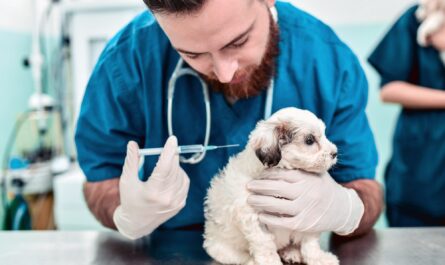
Vaccines play a vital role in protecting our animal companions from dangerous diseases. By vaccinating pets according to veterinary guidelines, we can help prevent the spread of illnesses and ensure our dogs, cats, and other animals live long, healthy lives.
What are Veterinary Vaccines?
A veterinary vaccine is a biological preparation that provides active acquired immunity to a particular infectious disease. Most veterinary vaccines contain an agent that resembles a disease-causing microorganism or is a killed or weakened version of the actual microorganism. The agent stimulates the animal’s immune system to recognize the agent as foreign, destroy it, and “remember” it, so that the immune system can more quickly recognize and destroy any of these microorganisms it encounters in the future.
There are different types of veterinary vaccines that target various disease-causing pathogens like viruses, bacteria, parasites, and fungi. Common vet-administered vaccines protect against rabies, canine distemper, feline leukemia virus, parvovirus, influenza, Bordetella bronchiseptica, and more.
Why are Veterinary Vaccines Important?
Vaccines play a crucial preventative role in veterinary medicine for several key reasons:
– Disease Prevention: Vaccines prevent pets from contracting dangerous infectious diseases in the first place. This protects animal health and limits the spread of illnesses within communities.
– Public Health: Certain zoonotic diseases like rabies can spread from animals to humans. Vaccinating pets against rabies not only protects the pets but also the human population from this almost always fatal virus.
– Herd Immunity: As more pets are vaccinated against specific diseases, the circulation of those pathogens decreases within the community. This helps provide indirect protection to unvaccinated animals and those with weak immune systems.
– Cost Effectiveness: The upfront cost of regular vaccination is vastly outweighed by the expense of treating a sick pet if they contract a preventable illness. Vaccines are also more affordable than long-term medication or hospitalization for pets that do become infected.
– Quality of Life: Pets that are current on recommended vaccines have stronger protection against diseases that can seriously affect quality and length of life. This allows them to avoid unnecessary sickness, pain, and other health issues associated with some viral and bacterial illnesses.
Which Vaccines Does My Pet Need?
The core vaccines recommended for most dogs and cats include:
– Rabies: All dogs and cats should be vaccinated against this deadly virus, which can be transmitted from animal to human through bites or scratches. Rabies vaccination is required by law in many jurisdictions.
– Distemper/Parvovirus: These two severe viral diseases are targeted with a combination “distemper vaccine” for dogs. Both can cause serious gastrointestinal illness.
– Feline Leukemia: A virus spread through direct contact that puts cats at risk of cancer and immune system suppression. An important vaccine for outdoor and shelter cats.
– Feline Respiratory Virus: Protection against two viruses causing upper respiratory infection in cats. Recommended for kittens and those with significant outdoor exposure.
Beyond these core vaccines, additional ones may be advised based on an individual animal’s lifestyle, local disease risks, and veterinary guidance. Discussing your pet’s needs with the vet can help determine an ideal vaccination schedule.
Benefits Outweigh Rare Risks
As with any medical intervention, vaccines do carry a very small risk of adverse reactions in some pets. However, these incidents are extremely rare when vaccines are administered by a veterinarian according to prescribed guidelines.
Potential risks or side effects are usually minor and short-lived, involving some swelling, discomfort, or fever after vaccination. Serious allergic reactions are exceedingly uncommon. The benefits of disease prevention through vaccination far outweigh these negligible risks for the vast majority of pets.
No vaccination program is 100% effective. However, when owners and veterinarians work together in compliance with current protocols, pets achieve high immunity levels against deadly and debilitating illnesses with minimal risks. Regular re-vaccination maintains this protection over the course of an animal’s lifetime.
The Bottom Line on Veterinary Vaccines
In conclusion, vaccinating our animal companions is one of the most important things we can do as responsible pet owners to safeguard their health. By following a clinic-designed vaccination plan tailored to each pet’s risks, households can keep dogs and cats protected from preventable dangers. This allows our pets to live to ripe old ages free from the suffering caused by lethal yet avoidable diseases. With vaccines, we give our animal friends the best possible shot at long, happy lives filled with good health.
*Note:
- Source: Coherent Market Insights, Public sources, Desk research
- We have leveraged AI tools to mine information and compile it


